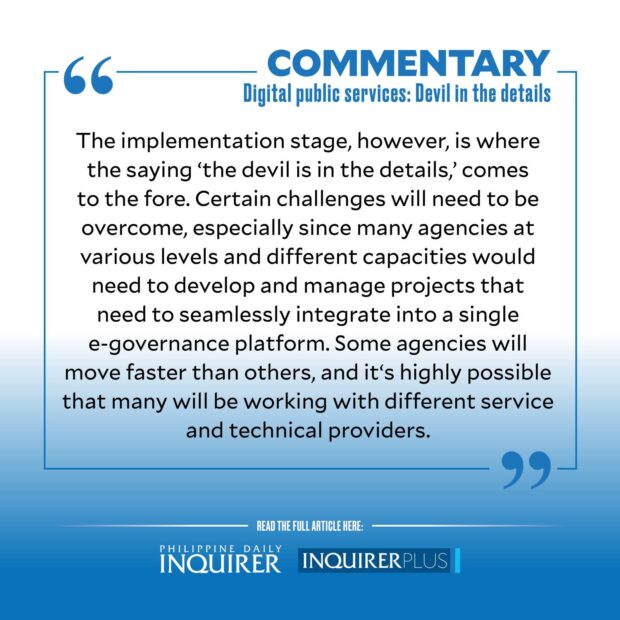Digital public services: Devil in the details
On March 6, 2023, the House of Representatives approved on third and final reading House Bill No. 7327 titled, “An Act institutionalizing the transition of the government to E-Governance in the digital age, creating for the purpose the Philippine Infostructure Management Corp. and appropriating funds therefor.” Speaker Ferdinand Martin G. Romualdez, the principal author of the proposed law, said the measure aims to make government services accessible to people by making it easier for them to transact with government and avail themselves of public services through digital platforms.
It’s about time that this move to digitalize public services and transactions under one portal or platform, along with the adoption of the “shared services” concept between government agencies, becomes a reality. There is no question about the benefits and convenience of digitalized public services as they make transactions more efficient and convenient, while also enhancing efforts to address corruption via transparent and accountable processes that can be verified by their “digital footprints.”
For example, I’m currently back in the Philippines and one of the things I set out to do during my visit was to renew my driver’s license. Even before arriving, I had set up my account on the Land Transportation Office’s (LTO) online Land Transportation Management System, took the test through the app, and filled out my renewal application. A few days after arrival, I went for my medical certificate at an accredited clinic conveniently located next to a driver’s license renewal center. It only took 10 minutes to get another license, valid for 10 years, from the time I got to the clinic. Now that’s digital transformation at work, and kudos to the LTO for setting up such a system.
Of course, a week or so later, the LTO ran out of plastic cards, but I believe that’s a different issue altogether. Nonetheless, what LTO has done as far as setting up a digital system for driver’s license transactions is a step in the right direction. With the House having done its part, the ball is now in the Senate. A March 13 editorial in this paper titled “Pushing e-governance” noted that a counterpart bill was filed in the Senate in August last year. The Senate is currently adjourned, but hopefully, this would be one of the bills it would prioritize once it resumes its session. As the editorial aptly noted, “It is time to stop government agencies from procrastinating and operating in silos, without any form of interconnection with other agencies’ systems, to the dismay of ordinary Filipinos.” Hopefully, the bill will be signed into law soon.
The implementation stage, however, is where the saying “the devil is in the details,” comes to the fore. Certain challenges will need to be overcome, especially since many agencies at various levels and different capacities would need to develop and manage projects that need to seamlessly integrate into a single e-governance platform. Some agencies will move faster than others, and it‘s highly possible that many will be working with different service and technical providers.
This is where the Department of Information and Communications Technology comes in, as it is the principal implementer of the proposed law tasked to formulate and promote the E-Government Master Plan that will serve as the blueprint for the development and enhancement of all electronic government services and processes. It needs to ensure that the terms of reference and/or contracts entered into with service and technical providers for e-governance projects won’t place agencies at the mercy of the service and technical providers of their respective projects. Crucially as well, agencies must ensure that they have exclusive rights over their data to avoid being held “hostage” by their service provider once their contract ends.
Given how dynamic the information technology industry is, agencies should also be able to easily upgrade their systems or switch to better ones to keep up with the times and provide a high quality experience for users of their platform. It must be foremost in one’s mind that in this initiative, the interest of the public availing of these digital services takes precedence.
—————–
Moira G. Gallaga served three Philippine presidents as presidential protocol officer, and was posted as a diplomat at the Philippine consulate general in Los Angeles, and the Philippine Embassy in Washington.





















